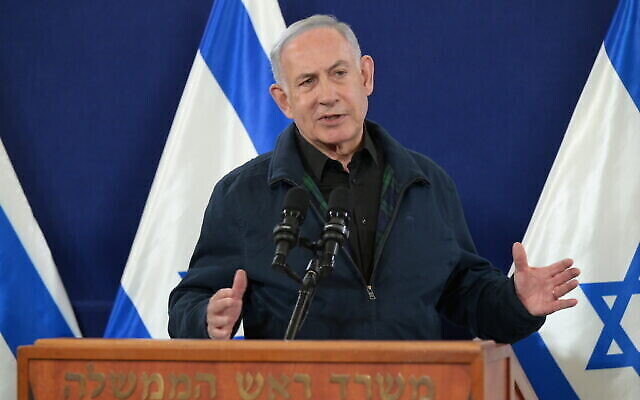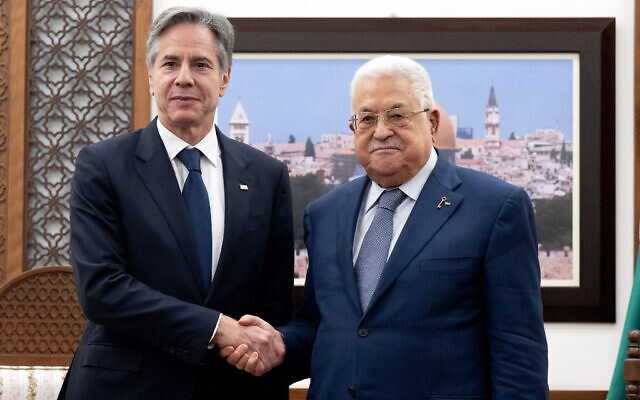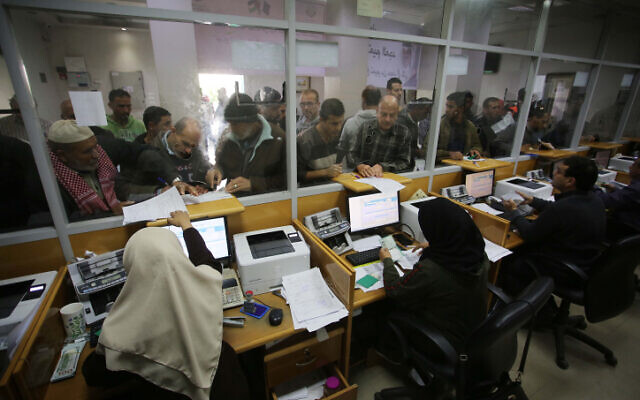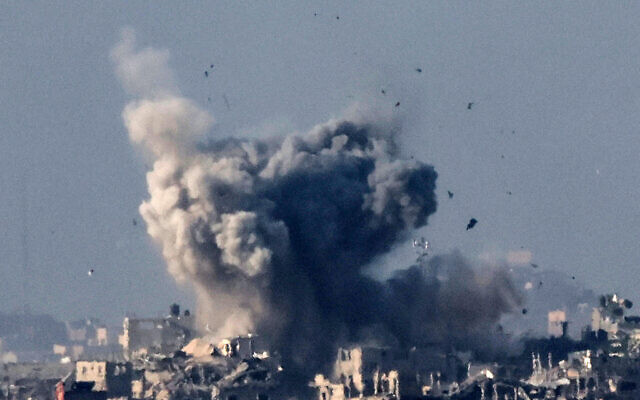Netanyahu vows ‘total victory’ against Hamas; says PA rejects Israel, can’t rule Gaza
At press conference, PM insists ground op is only way to destroy terror group, acknowledges differences with US, claims he let money into Strip for years for humanitarian reasons.

(THE TIMES OF ISRAEL) Prime Minister Benjamin Netanyahu vowed Saturday night not to allow the Palestinian Authority to take control of the Gaza Strip should Israel manage to remove Hamas from power, in sharp opposition to US President Joe Biden’s position and that of other key international actors.
Speaking during a press conference at the Kiryah army headquarters in Tel Aviv, Netanyahu accused the Ramallah-based Palestinian Authority of promoting and financing terrorism, and described its creation as “a terrible mistake.”
The prime minister also pledged to continue the war against Hamas “until the end” and until “total victory” is achieved over the terror organization, and claimed he had not been able to do so in previous rounds of conflict because there had not been the necessary domestic or international consensus to do so.
And Netanyahu promised to “do everything possible” to bring the remaining hostages back from captivity, while issuing a strong warning to Hezbollah, saying it would bring about the destruction of Lebanon if it initiated a broad war against Israel.
Answering questions about the Palestinian Authority’s potential role in a post-war Gaza, Netanyahu said forcefully that the Palestinian Authority “pays murderers” and “educate[s] their children to hate Israel and, to my sorrow, to murder Jews, and ultimately for the disappearance of the State of Israel.”
Continued the prime minister: “I’m not prepared to delude myself and say that this defective thing, established under the Oslo Accords in a terrible mistake,” should be allowed to govern Gaza.

“It was a terrible mistake to return the most hostile thing in the Arab world and the Palestinian world into the center of the Land of Israel, the heart of the land,” he went on.
Apparently referring to PA President Mahmoud Abbas’s Fatah and Hamas, Netanyahu said the Palestinian movement had “split into two, but the ideology, to my sorrow, that rejects the existence of Israel is common to both those factions. So I won’t repeat the mistake and put that entity into Gaza, because we’ll get the same thing.”
Added Netanyahu: “We would be putting the same element — utterly unreformed, utterly unchanged — into Gaza, and that’s what even the best of our friends suggest. I think differently. I oppose it. I think we need to build something else. Of course, [there must be] Israeli security control in the whole area… to ensure no rise of a terror entity for years to come. And the internal governance must undergo a totally different process.
“The PA has failed in this — it doesn’t fight terror, it finances terror; it doesn’t educate for peace, it educates for the disappearance of the State of Israel. That is not the group that should enter now.”
Biden and his Secretary of State Antony Blinken have both said that the Palestinian Authority — which rules Palestinian controlled parts of the West Bank — should ultimately return to govern the Gaza Strip, but Netanyahu and his right-wing and far-right coalition partners are strongly opposed to such a move.
Palestinian Authority President Mahmoud Abbas meanwhile has told the US that the PA will not return to Gaza “on an Israeli tank,” and is only prepared to govern the Strip if it’s in the context of a broader diplomatic initiative that leads to the establishment of a Palestinian state.
Netanyahu acknowledged the differences with the US, saying the US supports some of the war goals, “two of them for sure” — an apparent reference to public differences over the US call for a “revitalized” PA to eventually control Gaza in the context of a two-state solution.
“Ultimately this is our war. Ultimately we have to make the decisions. Ultimately, we do make the decisions,” he said. “We try and often succeed in convincing our American friends. I hope and believe that will be the case in the future.”
In response to a question about his previous policy towards Gaza, which critics have said strengthened Hamas’s rule in the coastal enclave, Netanyahu said the accusation was “a lie” and tried to refute the allegation.
“We hit Hamas, I hit Hamas, in Operations Pillar of Cloud, Operation Protective Edge and in Operation Guardian of the Walls. We killed their [military] chief of staff… we killed thousands of terrorists,” insisted a noticeably riled Netanyahu, referring to military operations in Gaza in 2012, 2014 and 2021.
Unlike many other senior officials, including the defense minister and the heads of the military and intelligence services, Netanyahu has not taken responsibility for the events of October 7 and has sought to blame the heads of the armed forces and intelligence services instead.

He claimed the large amounts of cash he allowed Qatar to pass to Hamas in Gaza and other benevolent policies had been designed to prevent a humanitarian collapse. He also contended that “we didn’t have either the internal national consensus or the international consensus” to destroy Hamas in the past, a reality that Netanyahu said has now changed in light of the domestic will to eliminate the terror group.
“Now we will finish the job,” he said.
In his initial remarks, Netanyahu insisted that destroying Hamas was impossible without the IDF’s ground operation in Gaza.
“I am saying plainly and clearly: we will continue with the war until we achieve all its goals. And you cannot achieve these goals without continuing the ground invasion,” Netanyahu said, and reiterated this message to “our friends around the world.”
He added that the security forces were “observing international law” while conducting the campaign with “determination, with power.”
Turning to the northern front with Hezbollah, which has renewed attacks against Israel since the ceasefire with Hamas collapsed, Netanyahu said the IDF was being proactive in fighting the Iran-backed terror group and had adopted a policy of “strong deterrence in the north” against Hezbollah and “clear victory in the south” against Hamas.
“It should be clear, we are committed to restoring security to the south and the north. If Hezbollah makes a mistake and enters into a broad war it will destroy Lebanon with its own hands,” averred the premier.
He also addressed the weeklong truce with Hamas in which the terror group released 110 Israeli hostages captured on October 7, and said despite his misgivings it had been justified.

Some elements on the far-right, including National Security Minister Itamar Ben Gvir and his Otzma Yehudity party, criticized the truce, arguing it undermined the military effort to destroy Hamas.
“I was very hesitant in the days before the deal, I asked myself, ‘How can you negotiate with this satan who slaughtered, murdered, dismembered and burned people — women, children and babies. A satan for whom life has no value,’” said Netanyahu.
“But at the same time it was clear to me that we had a way to rescue people from the clutches of this satan, many dozens of our hostages, and I could not relinquish that opportunity.”
Asked how he would respond if Hamas could again be brought to a truce, he said: “Hamas breached the agreement. I said we’d resume the war if they did, and that’s what happened.”
Questioned about his political future, Netanyahu said he was unfazed by his low polling numbers since Hamas invaded Israel on October 7, slaughtering some 1,200 people and taking 240 hostages, and appeared to indicate he aimed to carry on serving as prime minister after the war is over.
“I don’t deal with surveys. I received a mandate from the citizens of Israel to lead the State of Israel… If we worked on the basis of daily surveys, I wouldn’t be here for a day, it seems to me.”
Asked about the killing by an IDF soldier of a civilian who thwarted Friday’s deadly terror attack in Jerusalem, Netanyahu acknowledged that more guns in the hands of the public can produce more such tragic incidents. But more civilians with guns can save the day in times like this, he said, defending his government’s policy on encouraging more eligible Israelis to carry weapons.
“Therefore, I think that in the current situation we need to continue with this policy — I definitely support it. We may pay a price, but such is life,” he said.
Netanyahu was also asked why he and Defense Minister Yoav Gallant held separate press conferences, minutes apart.
“I suggested to the defense minister tonight to hold a joint press conference. He decided what he decided,” said Netanyahu.
Gallant’s office responded that “sometimes we hold press conferences together and sometimes separately.”

comments